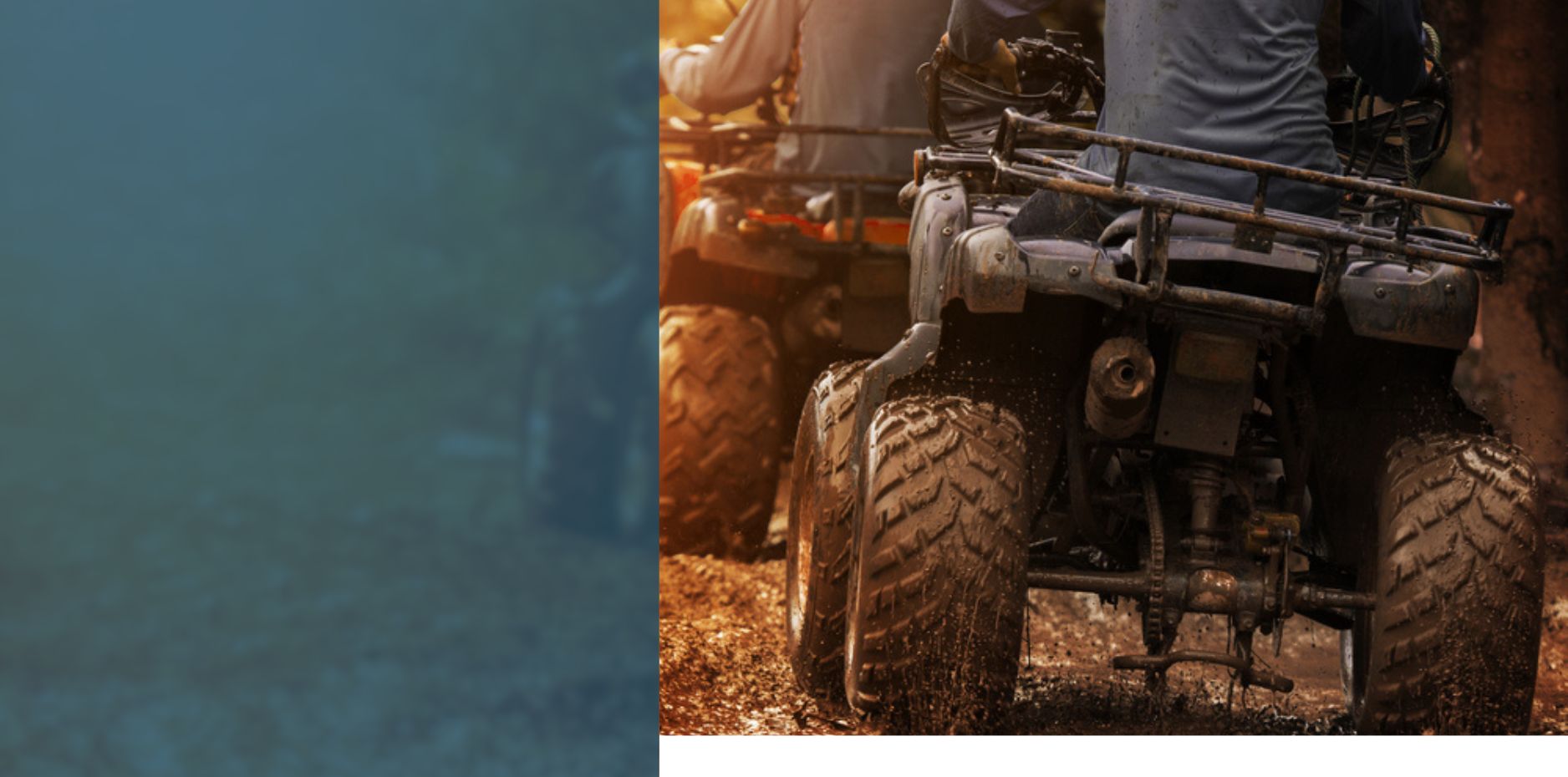
California ATV Accident Lawyer
California is home to dozens of world-class trails used by all-terrain vehicles (ATV), utility task vehicles (UTV), and side-by-sides (SxS). While these vehicles offer fun and exhilaration, California riders should know the state’s regulations, safety rules, and risks that come with offroad vehicles.
According to data from the U.S. Consumer Product Safety Commission (CPSC), offroad accidents cause over 700 deaths every year and an estimated 100,000 injuries that require treatment in emergency departments. ATVs are involved in most offroad accidents that cause injuries and deaths.
If you or a family member were involved in a California ATV accident caused by negligence or wrongdoing, you need a lawyer with experience taking on these types of cases and winning compensation for clients. At Wisner Baum, our ATV injury attorneys have litigated offroad accident lawsuits for decades. Put simply, our firm has the resources and skills to take on any corporate defendant and win.
Our ATV/offroad accident casework:
- In 2024, we filed an offroad accident lawsuit on behalf of a man who sustained catastrophic injuries in a dune buggy accident at Glamis Dunes. The lawsuit alleges plaintiff James Montano’s injuries were the direct result of the dune buggy owner and manufacturer’s failure to provide adequate safety devices.
- Wisner Baum represented the family of a spectator who was killed in an offroad race accident at the Imperial Sand Dune Recreational Area.
- Our accident lawyers filed a wrongful death lawsuit on behalf of a mother whose son was killed when an offroad driver crashed into a crowd of spectators at the California 200 desert race.
Wisner Baum offers free and confidential case evaluations to clients interested in learning more about their legal rights after an ATV crash. Our firm represents you on a contingency fee basis, which means we only get paid if we win compensation on your behalf.
Fill out our case evaluation form today or call us at 855-948-5098 to speak with a California ATV accident lawyer.
California ATV Accidents – Your Legal Rights Explained


Contact our experienced attorneys to learn about your legal options. Your consultation is free and confidential.

-
$2.0 Billion Verdict Personal Injury
In May of 2019, the jury in the case of Pilliod et al. v, Monsanto Company ordered the agrochemical giant to pay $2.055 billion in damages to the plaintiffs, Alva and Alberta Pilliod, a Bay Area couple in their 70s.
-
$289.2 Million Verdict Personal Injury
On Aug. 10, 2018, a San Francisco jury ordered Monsanto to pay $39.25 million in compensatory damages and $250 million in punitive damages to Mr. Johnson, a former groundskeeper who alleged exposure to Monsanto’s herbicides caused him to develop terminal non-Hodgkin lymphoma.
-
$265 Million Settlement Fatal Train Crash
In 2016, Wisner Baum attorney Timothy A. Loranger and six other attorneys in the Plaintiffs’ Management Committee were able to secure a $265 million settlement for victims of the 2015 Amtrak 188 derailment in Philadelphia, one of the largest in the U.S. for 2016.
-
$105 Million Settlement Pharmaceutical Settlement
Wisner Baum obtained $105 million on behalf of multiple clients involved in a pharmaceutical negligence case.
-
$80 Million Verdict Personal Injury
Wisner Baum attorneys served on the trial team in the case of Hardeman v. Monsanto Company, which resulted in an $80 million jury verdict for the plaintiff, Edwin Hardeman.
California Vehicle Code 111 defines all-terrain vehicles (ATVs) as:
- Three or four low-pressure wheels, depending on the vehicle's age.
- Frame width no greater than fifty inches and a weight limit of 900 pounds.
- One seat for the rider to straddle while operating the vehicle.
- No more than one additional seat for a passenger.
- Handlebars as a means of steering.
Yes, they can be. According to government data, over a recent three-year period, there were a total of 2,211 deaths in the U.S. that were linked to offroad vehicles, which include all-terrain vehicles (also known as quads or four-wheelers), recreational off-highway vehicles, and utility-terrain vehicles. ATVs accounted for over 70% of these fatalities, with nearly 300 deaths occurring among children under the age of 16.
ATVs are particularly dangerous for kids. According to data from the American Academy of Pediatrics (AAP), four kids go to U.S. emergency rooms for injuries sustained in an ATV accident every hour. Between 1982 and 2015, ATV crashes caused more than 3,000 child deaths, per AAP statistics.
Offroad vehicles weigh upwards of 600 pounds and can reach speeds of 65 mph or more. Their speed coupled with their lack of safety devices such as seatbelts, roll bars, and safety cages, can cause serious catastrophic injuries that can be life-threatening.
Some of the most common offroad and ATV injuries include:
- Traumatic brain injuries or spinal cord injuries commonly occur if a rider is ejected from an ATV motorcycle.
- In instances when the vehicle flips over and lands on top of the rider, internal bleeding, broken bones, or crushing injuries are likely to take place.
- Bruises, scrapes, and lacerations are also common.
If you are involved in an offroad accident, the first thing you need to do is seek treatment immediately. Our legal team can help you find the care so you can focus on regaining your health.
ATVs are smaller, motorcycle-style vehicles with handlebars designed for off-road use. They are typically used for recreational purposes such as trail riding or racing. ATVs have a low center of gravity and are designed to be nimble and maneuverable.
UTVs, or utility terrain vehicles, are larger, side-by-side (SxS) vehicles that can accommodate multiple passengers. UTV drivers operate these vehicles via a steering wheel and foot pedals. Because they are capable of carrying more passengers and cargo than ATVs, UTVs are often used for work purposes such as farming, ranching, or construction, as well as for recreational activities like hunting or trail riding. UTV and SxS rentals have skyrocketed in recent years.
One of the main differences between ATVs and UTVs is their handling characteristics. ATVs are more responsive and agile, making them better suited for activities that require quick maneuvering. However, this agility can also make ATVs more prone to rollover accidents, especially if driven recklessly.
There are also differences between ATVs and UTVs from a legal perspective. In California, both types of vehicles must be registered with the Department of Motor Vehicles (DMV) and comply with safety regulations. However, there are specific laws and regulations that apply to each type of vehicle, so it's important to understand the requirements for the specific type of vehicle you are using.
California law defines a UTV or SxS as:
- Designed for off-highway use
- Has steering wheel for control
- Non-saddle seating for all passengers
- Has a maximum speed in excess of 30 miles-per-hour
- Has engine displacement equal to or less than 1000cc
You can learn more about the rules and regulations for California recreational off-highway vehicles here.
California is a beautiful state with mountains, beaches, deserts, and more to explore. Californians and thousands of others from all around the world come to California to ride its ATV trails. Below are some of the best ATV trails in California, according to reviews in ATV sites like Trailsource:
- Glamis Dunes (Imperial County, CA): Also known as the Imperial Sand Dunes Recreation Area, Glamis Dunes is one of the largest dune systems in the country and the most popular ATV destination in California. The popular ATV site can be accessed from Highway 78, just east of Brawley, California or along Interstate 8 west of Yuma, Arizona.
- Corral Canyon OHV Area (San Diego County, CA): With over 1,800 acres, Corral Canyon ATV trails offer picturesque beauty and rugged terrain. From San Diego, Corral Canyon can be accessed via I-8 and exiting at Buckman Springs Rd.
- Forest OHV System / Big Bear OHV (San Bernardino County, CA): Located in the San Bernardino National Forest, this unique trail system is open to red and green stickers. Trail access is in the Cajon, Arrowhead, and Big Bear areas.
- Ocotillo Wells State OHV Area (San Diego County, CA): Southwest of the Salton Sea, this ATV area has over 85,000 acres of desert landscape for riders to explore. Perks of this site include no camping or day use fees. Trails can be accessed off Highway 78.
- Chappie / Shasta OHV Area (Shasta County, CA): This site offers rolling, brushy hills with over 250 miles to explore. Just northeast of Redding, Chappie Shasta OHV area accessible via Interstate 5 to the Shasta Dam exit, then west across the dam until reaching the staging area.
California has laws for off-highway vehicles. Below are some important California laws for ATVs that riders need to comply with:
- All operators must be able to reach pedals and operate all controls.
- Parents are legally responsible for selecting appropriately sized ATVs for their children and supervising their use.
- Riders may only carry passengers if the ATV has an extra seat. Seat kits are not deemed safe, and ATVs that promote them should not be used.
- All riders must wear helmets.
- Adults riding alone do not need an ATV safety certificate, but they may require one if riding with a child.
- Riders aged 14-17 must have an ATV safety certificate (more on this below).
- Riders aged 14-17 need adult supervision when operating an ATV.
- Riders under 13 must be supervised by an adult with an ATV safety certificate.
In addition to the California ATV laws, the following off-highway rules must also be followed:
- ATV riders must also adhere to general off-highway vehicle traffic requirements.
- ATV speed must comply with speed limits and all traffic laws while on roadways. Off-road, the rider should use judgment when determining speed, except when within 50 feet of other individuals, campsites, or animals. In these cases, the speed limit is 15 mph.
- ATV riders must not operate their vehicles in a reckless manner off-highway and must comply with signage in designated areas.
- Riders with suspended or revoked licenses must not operate their ATVs until the DMV reinstates their license.
- Open-container and DUI laws apply to ATV operation.
- ATVs must have functioning lights that the rider must activate 30 minutes before sunset and 30 minutes after sunrise. These lights should include a front-facing white light and a rear-facing red light.
The Department of Motor Vehicles (DMV) identifies the safety requirements of offroad vehicles (or off-highway vehicles, OHV) through green and red stickers. Anyone who rides an ATV off-highway must have either a green sticker or a red sticker issued by the California DMV.
Green Sticker: Allows riders to use ATVs on public land designated for off-highway vehicle recreation. Green-stickered vehicles meet the California Air Resource Board's (CARB) air emission standards. This means the owner can operate their ATV anytime during the year. Green stickers cost $52 and need to be renewed every two years.
Red Sticker: Restricts riders from using ATVs during non-designated riding seasons. Red stickers apply to ATVs made in 2003 and onwards that do not meet CARB's emission standards. Riders cannot modify a red sticker ATV as this regulation is enforced at the manufacturer level. This means that any ATV with a vehicle identification number (VIN) indicating red-sticker status will remain in that category, even if modifications are made. To avoid purchasing red sticker ATVs, consumers should buy from DMV-approved companies.
Riders must affix their stickers to the rear quadrant of their ATV's permanent metal or plastic frame.
As we have discussed. ATV riding can be dangerous, even for those with experience. To protect yourself and your family, it is a good idea to pursue an ATV safety certificate. California offers several ATV training sites. You can schedule an appointment at the following California state recreational vehicle areas (SRVA):
- Carnegie SVRA | Tracy, CA
- Clay Pit SVRA | Oroville, CA
- Heber Dunes SVRA | Heber, CA
- Hollister Hills SVRA | Hollister, CA
- Hungry Valley SVRA | Gorman, CA
- Ocotillo Wells SVRA | Borrego Springs, CA
- Prairie City SVRA | Rancho Cordova, CA
If an ATV rental company or manufacturer caused or contributed to the accident, they may be held liable in a lawsuit. However, the burden of proof falls on the claimant, or the person that files the lawsuit. Burden of proof simply means that that plaintiff must demonstrate to the court that the defendant owed the plaintiff a duty of care, breached that duty, and directly caused the damages alleged in the ATV accident lawsuit.
Knowing your rights and understanding the legal avenues available to you are vital in pursuing a successful case following an ATV or offroad accident. By hiring an experienced ATV accident lawyer, you can ensure that your rights are protected, and you receive the compensation you deserve.
Recovering from an ATV injury can be a difficult and costly process, especially when children are involved. Families often face the financial burden of steep medical bills, lost income from missing work, and other expenses.
This is where an ATV accident lawyer can step in to help.
At Wisner Baum, we have a proven track record of assisting families after life-changing accidents. When you work with a California ATV accident lawyer from our firm, you can expect the following:
- We will conduct a thorough investigation to determine who is responsible for the accident. We leave no stone unturned in finding any and all wrongdoing.
- We will calculate all damages, including past and future medical expenses, lost income, and more to ensure that you receive the compensation you deserve.
- We will provide you with legal guidance and support throughout the entire process, keeping you informed and involved every step of the way.
- We prepare every case as if it’s going to trial. If settlement negotiations do not produce the result you deserve, we will not hesitate to bring the case before a jury.
When you work with Wisner Baum, you get the peace of mind that comes with knowing your legal rights are protected while you and your family focus on recovery. With over 40 years in practice and $4 billion in verdicts and settlements, your case is in good hands with us.
Two of the most common questions we are asked: How much can I get by pursuing an ATV accident lawsuit, and is it worth hiring a lawyer for my accident case? The value of an ATV claim can vary depending on the facts and circumstances of the accident. An experienced California ATV attorney will conduct an investigation, interview witnesses, review evidence, and, if needed, hire experts to accurately assess the value of a potential settlement.
Damages that may be possible to pursue after an ATV accident include:
- Pain and suffering
- Health care bills, including rehabilitation and physical therapy
- Loss of income
- Lost earning capacity
- Reduced quality of life
- Damage to property
- Loss of consortium
One thing to remember is that dealing directly with an insurance company to secure a settlement can potentially harm your claim. Some insurance adjusters may try to undervalue your case and persuade you to accept a lower settlement amount. This is where an experienced offroad accident attorney can help protect your legal rights. At Wisner Baum, we handle all communications with insurance companies on your behalf so you can focus on recovering from your injuries.
If you are unsure whether you need a lawyer for an ATV crash claim, you should consult with a lawyer just to make sure you are on track to receive full and fair compensation in a settlement. Remember, lawyers offer free case evaluations, so you have nothing to lose by contacting a lawyer.
Our team of ATV crash lawyers is ready to fight for the justice and compensation you deserve. With offices throughout California, we have the resources to take on any corporate defendant.
Wisner Baum’s California offices:
Call 855-948-5098 today to learn more about your legal rights following an offroad accident.
If you have been involved in an ATV wreck in California, we recommend taking the following actions:
1. Seek immediate medical attention: ATV crashes can result in significant injuries. If you are able, call 911. Do not leave the scene without being cleared by a medical professional or an emergency responder. Even if you feel physically fine, it is a good idea to schedule an appointment with your doctor just in case you need x-rays, an MRI, or other care. Our attorneys have represented numerous clients who did not know their injuries were serious until days later. Get checked out, just to be on the safe side.
2. Collect relevant information: Gathering evidence is crucial for your claim. We recommend obtaining witness accounts, names, addresses, and driver's licenses if the accident involved others. If you rented an ATV, document the company you rented from, along with the make/model of the vehicle.
3. Take pictures to document the wreck: Photos of the wreckage and any other vehicles involved will help your ATV accident lawyer build your case. We also recommend taking pictures of your injuries and the crash area, including any signage in the area.
4. Notify the insurance company: While filing an ATV accident claim has similarities to a car accident claim, there are some differences to be aware of. Not all states require ATV insurance, including California, but it is still advisable to have ATV coverage. Contact your insurance company immediately after the accident to initiate the claims process and provide your statement.
5. Contact a California ATV accident lawyer: If you or someone in your family suffered serious injuries in a quad or four-wheeler crash, the attorneys at Wisner Baum can help. We understand the physical and financial impact an ATV accident can have. With decades of experience litigating cases for California crash victims, let us take care of your claim so you can focus on what is most important: healing.
Off-road vehicles, including ATVs, dirt bikes, dune buggies, and others, are more prone to tip over or go out of control when riding at high rate speeds or operated by an inexperienced driver. Even when operated safely, ATVs and offroad vehicles can crash due to a mechanical issue or manufacturing defect.
The leading causes of off-road vehicle accidents include:
- Speeding
- Performing dangerous stunts
- Lack of training
- Driving on a paved road
- Overloading the vehicle with a passenger
- Alcohol
While negligence is the most common cause of offroad accidents, there are also situations when the vehicle manufacturer may be at fault due to a defective or poorly designed vehicle or component. You may be wondering; how do you know if an ATV accident was the result of negligence or an issue with the vehicle? Scheduling a consultation with one of our offroad accident attorneys will inform you of your rights and options. If you decide to hire the California ATV crash lawyers at Wisner Baum to pursue justice and compensation on your behalf, we will begin the process of building your case right away.

.2411011325574.jpg)

